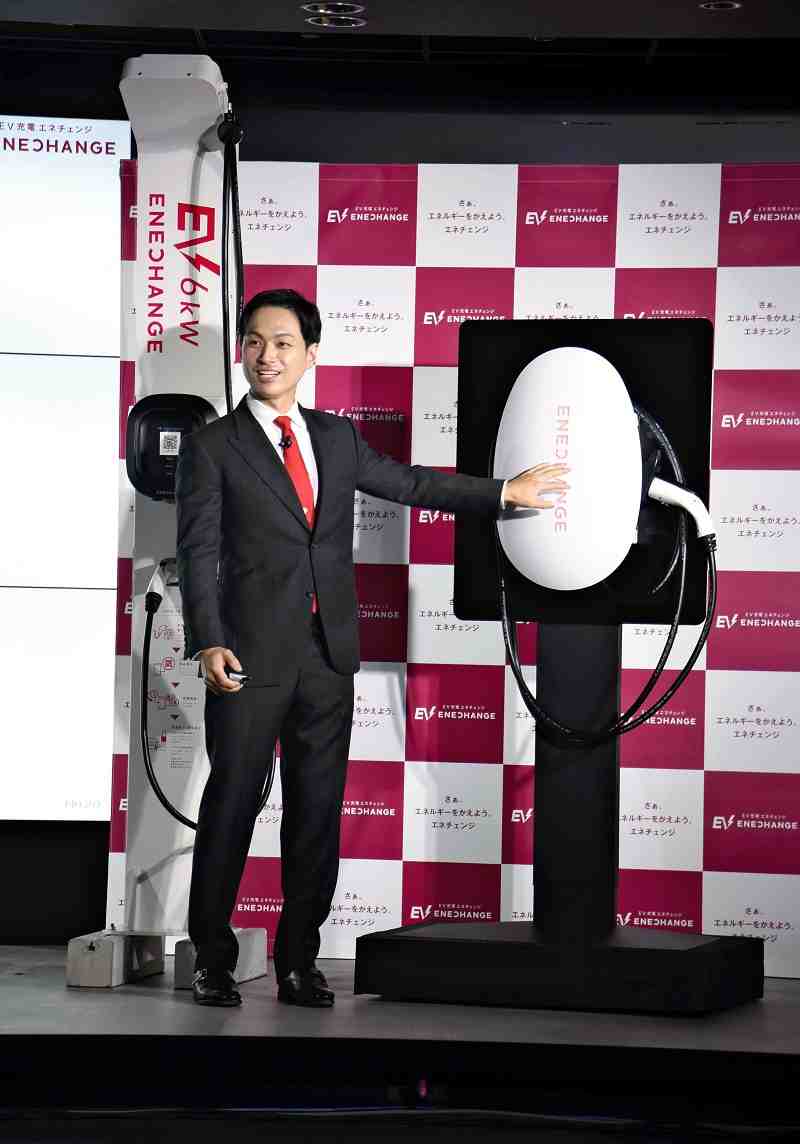
Yohei Kiguchi, CEO of Enechange, shows a charger built for apartment buildings, in Minato Ward, Tokyo, in November.
6:00 JST, December 9, 2022
Services to install electric vehicle chargers in apartment buildings are being offered by an ever-growing number of companies. Yet, unlike detached houses, where EVs can readily be recharged via an electrical outlet, apartment buildings require expensive charging stations that need the consent of residents before they can be installed, making it difficult for EV chargers to be spread to such residences. In preparation for the arrival of an era of widespread EV use, companies are devising ways to make adopting such chargers easier for apartment blocks.
The optimal solution
Enechange Ltd., a company that installs chargers in commercial and accommodation facilities, announced on Nov. 11 its launch of an EV charging service tailored to apartment blocks.
The most distinctive feature of the service is how it provides charger installations for free and imposes no monthly fees and only charges charging fees used by residents. “The simplest, the best way to secure consensus among residents in apartment blocks is to charge nothing [except for vehicle charging],” Yohei Kiguchi, CEO of Enechange, said emphatically.
When retrofitting an apartment building with an EV charger, one needs to gain consent from the management association that comprises the building’s residents. However, with few people using EVs today, it is difficult to get those residents who drive gasoline-powered cars to provide their consent. Enechange aims to make it simpler for apartment blocks to install such chargers by offering a plan that will be easier for everyone to accept, even for those residents who do not own EVs.
Vital for wider use
This year, leading automakers, both domestic and foreign, have launched one new EV model after the other. Domestic sales of EVs in September totaled approximately 8,500 vehicles, more than three times the number sold in the same month last year.
However, EVs are limited by their driving range and are said to be more suitable for use in urban rather than rural areas, where long-distance drives are often a necessity. Light EVs, which were developed jointly by Nissan Motor Corp. and Mitsubishi Motors Corp. and are offered by Nissan under the brand name “Sakura” and by Mitsubishi under the name “eK X EV,” are selling well and have a range of 180 kilometers per charge.
Yuichiro Shimura, chief consultant at Mitsubishi Research Institute, Inc., points out that “If installing charging systems in apartment blocks is not made easier, the use of EVs in Japan will not gain pace.”
Profitability a challenge
Against this backdrop, one company after another has launched services tailored to apartment buildings.
In June, YourStand, Inc., an EV charging station operator based in Yokohama, began offering a service that enables multiple EVs to be charged at once in mechanized parking bays.
Japan Delivery System Corp., a major provider of delivery lockers based in Nagoya, has introduced a charger that allows users to check their usage of the charger on the screen of a delivery locker.
The challenge lies in the high cost of installation. While the cost to install a charger at a detached house runs as low as several tens of thousands of yen, the installation cost for an apartment building, where costs for installation and other work tend to run high, is estimated to be around ¥2 million for a fast charger.
With Enechange offering no-cost installations and not charging any monthly fees, Kiguchi said the company “can’t make a profit from the apartment block service alone right now. We can provide the service only because we have other recharging services.”
Real estate companies are also taking action. Tokyu Land Corp. had chargers installed for all 19 parking spaces in an apartment building in Tokyo that the company finished constructing in November. If chargers are installed before the sale of an apartment block, there’s no need to gain the consent of residents.
According to statistics compiled by the Internal Affairs and Communications Ministry, people living in apartment blocks and other apartment complexes account for 40% of all households in Japan. The central government has been providing generous support for apartment blocks and commercial facilities to install EV chargers, including subsidies that fully cover installation work. But it is unclear how long similar support will continue.
In addition, if EVs become more widespread and charging is concentrated on weekends and at night, the cost of electricity could easily rise. “We also need a system to disperse the time of use so that the burden on the power grid does not become excessive,” Mitsubishi Research Institute’s Shimura said.
Top Articles in Business
-

Prudential Life Insurance Plans to Fully Compensate for Damages Caused by Fraudulent Actions Without Waiting for Third-Party Committee Review
-

Narita Airport, Startup in Japan Demonstrate Machine to Compress Clothes for Tourists to Prevent People from Abandoning Suitcases
-

Japan, U.S. Name 3 Inaugural Investment Projects; Reached Agreement After Considerable Difficulty
-

Toyota Motor Group Firm to Sell Clean Energy Greenhouses for Strawberries
-

SoftBank Launches AI Service for Call Centers That Converts Harsh Customer Voices into Softer Voices
JN ACCESS RANKING
-

Japan PM Takaichi’s Cabinet Resigns en Masse
-

Japan Institute to Use Domestic Commercial Optical Lattice Clock to Set Japan Standard Time
-

Israeli Ambassador to Japan Speaks about Japan’s Role in the Reconstruction of Gaza
-

Man Infected with Measles Reportedly Dined at Restaurant in Tokyo Station
-

Videos Plagiarized, Reposted with False Subtitles Claiming ‘Ryukyu Belongs to China’; Anti-China False Information Also Posted in Japan






















